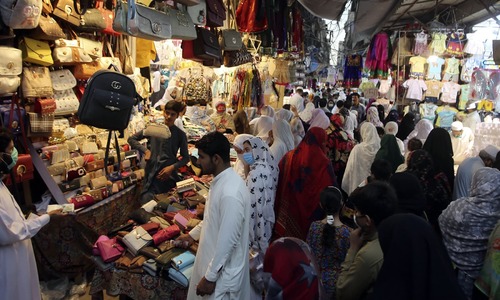Stocks on the Pakistan Stock Exchange plunged once again on Monday, an almost identical trajectory to the one witnessed on the previous trading day (Thursday), as rising Covid-19 cases in the country and around the world rattled investor sentiment, pushing the benchmark index down approximately 1,000 points within an hour of the opening bell.
The KSE-100 index was down 963.74 points at 38,924.26 by 12:55pm.
Commercial banks were among the top losers, followed by oil and gas exploration companies, cement, and oil and gas marketing companies.
"The market is under pressure due to the fear of a global lockdown amid rising coronavirus cases," said Mohammad Sohail of Topline Securities.
"Overall sentiments are weak due to uncertainty on rising virus cases, falling oil prices and the likely impact of the US elections," he added.
Read: Here's everything you need to know about the US voting process
Oil-related stocks were under pressure due to falling crude prices on account of worsening demand during lockdowns.
"The benchmark WTI oil price has fallen more than four per cent since last Friday to $34.5 per barrel, extending losses to approximately 12pc, on growing concerns that the rise in cases in Europe and the United States could hurt fuel consumption," said Sherman Securities, a brokerage house.
Coronavirus cases have been on the rise in Pakistan. Last week, the number of daily Covid-19 cases surpassed the 1,000 mark for the first time since the end of July.
According to data from the National Command and Operation Centre, 1,123 people tested positive for the virus on November 1 out of a total of 27,953 tests conducted – which translates into a positivity rate of 4.02pc.
Meanwhile, the United Kingdom, Germany and France have announced lockdowns as cases in Europe doubled in the last five weeks with total infections surpassing the 10 million mark.
"A notable increase in Covid-19 cases together with declining oil prices triggered a risk-off mood with broad-based selling pushing the benchmark KSE-100 index to an intra-day low of 38,807 (down 2.79pc),” said Umer Farooq, an analyst at AKD Securities.
"Near-term outlook remains choppy with many uncertainties surrounding the Covid-19 situation and the US presidential elections likely to keep the market volatile," he said.
Oil falls 4pc on fuel demand concerns
Oil prices fell four per cent on Monday on worries that widening coronavirus lockdowns in Europe would weaken fuel demand and amid concerns about turbulence over this week's US presidential election.
Brent crude futures for January dropped $1.49, or 3.9pc, to $36.45 a barrel while US West Texas Intermediate (WTI) futures fell $1.58, or 4.4pc, to $34.21.
Brent fell as much as 5.8pc and WTI as much as 6pcin early trade, hitting their lowest levels since May. Countries across Europe have reimposed lockdown measures to try to slow Covid-19 infection rates that have accelerated in the past month.
Global oil trading companies expect further demand destruction although estimates differ. Vitol sees winter demand at 96 million barrels per day (bpd) while Trafigura expects demand to fall to 92 million bpd or below.
“A lot of traders are now looking at the US and their rising infection rates and wondering if Europe is providing the model for what will happen in the US in the coming weeks,” said Michael McCarthy, chief market strategist at CMC Markets in Sydney.
Oil pared some losses after Japan's export orders grew for the first time in two years and China's factory activity rose to a near-decade high in October. More manufacturing surveys are expected from the eurozone and the United States later in the day.
Still, concerns about weakening demand and rising supplies from Opec and the United States caused oil prices to fall for a second straight month in October, with WTI falling 11pc and Brent 8.5pc.
Rising supplies from Libya and Iraq, members of the Organisation of the Petroleum Exporting Countries, offset production cuts by other Opec members and caused the group's output to rise for a fourth month in October, a Reuters survey showed.
Opec and their allies including Russia, a group known as Opec+, are cutting output by about 7.7 million barrels per day (bpd) to support prices.
Opec+ is scheduled to hold a policy meeting on November 30 and December 1 and some analysts expect it to delay plans to ramp up output by 2 million bpd from January.
Oil demand is outpacing supply by 2.5 million bpd and that deficit will likely remain this winter as consumption for heating and emerging markets is set to rise by about 1.5 million bpd, offsetting the hit from European lockdowns, Goldman Sachs said in a note.
Delaying the output rise would help secure a large deficit through the first quarter of next year and the rest of 2021, they said.
In the United States, the total oil and natural gas rig count rose in October for a third straight month, according to Baker Hughes data.
A tighter race in the lead up to the US election on Tuesday and electoral uncertainty prompted investor caution in global markets.
“The most immediate concern for markets is that political paralysis will delay or diminish a fiscal response to the deteriorating coronavirus situation,” CMC's McCarthy said.














































